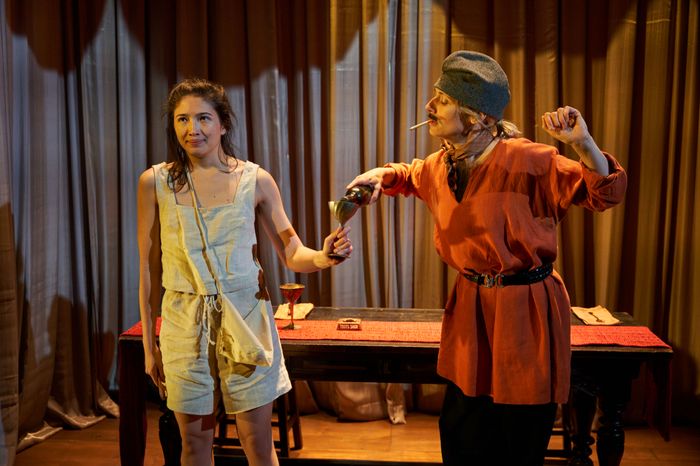
Is there a more terrifying, fascinating, weirdly appealing time in the occidental imagination than the Middle Ages? There’s an undeniable frisson in the clash between its ruthless reality and its mythos, which ranges from ultra-romantic to sublimely silly. Our brains (eventually) know that girls got married off at 12, or died of their first pregnancy, or got sent to abbeys to avoid getting raped, or got raped, or all of the above. But oh, those castles, those pointy hats, those sleeves!
That tension between brutality and whimsy sits at the center of Emma Horwitz’s Mary Gets Hers. Or at least, it’s supposed to. The play’s starting point is irresistible: Horwitz is riffing on a medieval closet drama by Hrotsvitha, a cannoness at an abbey in Lower Saxony (somewhere in modern Germany) during the 10th century, and an all-around badass who’s generally considered the first woman historian, the first woman Germanic poet, and the first Western dramatist since the fall of Rome. Hrotsvitha’s Abraham, or the Rise and Repentance of Mary was itself a playful adaptation — the cannoness modeled her writings after those of the Roman playwright Terence, creating Christian morality plays that were unusually strong on character and comedy.
Those two C’s also anchor Horwitz’s work. Mary Gets Hers is wacky and winking, big on slapstick-and-clown-inspired physicality and, when it’s at its best, totally charming in its quirkification of Hrotsvitha’s dramatis personae. It’s also inconsistent. The unlucky irony of the play is that it sets out—you can probably tell from the name—to center and humanize its title character, liberating her from medieval morals and misogyny, but the funniest and ultimately most human characters in Mary Gets Hers turn out to be its men. In between scenes of comic bravura, and even touches of real pathos, Mary’s story keeps trying to push itself to the fore — and keeps missing the mark.
Horwitz pretty much sticks to Hrotsvitha’s plot: After the death of her parents (here from a weird plague that “[turns] people into foam”), a young orphan girl named Mary (Haley Wong) is taken in by two hermits, Abraham (Susannah Perkins) and Ephraim (Octavia Chavez-Richmond), who zealously commit to protecting her “loveliness and purity” from the “taint of sin.” (In a nod to Hrotsvitha’s custodianship over an abbey of girls, Horwitz specifies that her own drama be cast entirely with “women, non-binary, trans, and gender-variant actors,” with the idea—not explicit in the performance—that perhaps we are watching these excited young novices putting on the play.) But after four years cooped up in a monastery, Mary runs away and heads straight for (figurative) sin city. Abraham sets out to rescue her, and redemptive high jinks ensue — or, in Horwitz’s version, self-actualizing high jinks that renounce the need for redemption.
Here’s where I admit that I would immediately binge a spin-off series devoted to Abraham and Ephraim. Perkins and Chavez-Richmond are delivering absolutely winning performances, expertly walking the line between buffoonery and poignancy. Actually, they’re not walking it so much as scooting adorably along it. Dressed in classic monks’ habits, rubber-pated tonsure wigs, and, hilariously, brown camo Crocs with socks (all of it by costume designer Camilla Dely), the hermits move with a kind of prim, slightly bouncy shuffle. That is, when they’re not sleeping facedown on their bibles or performing a variety of serious-faced, Donald O’Connor–meets–Bob Fosse dances during the play’s interludes. Director Josiah Davis has a flair for comedic choreography—the kind that needs to be tight and broad at the same time—and Perkins and Chavez-Richmond just kill it. With her chin tucked and her lips pursed in practiced sanctimony, Chavez-Richmond nails both Ephraim’s absurdity and his sad, competitive loneliness. “Hey God? God, it’s me. Ephraim. Ephraim, the hermit?” she mumbles, dopey and self-deprecating and yearning, like a middle schooler asking his crush if she wants to, like, hang out later, or whatever. “I just wanted to make sure you didn’t forget who I was? Because? Another person got betrothed to you today! Which is amazing, really, I hope everyone is betrothed to you, really, I do, but, I just wanted to make sure you still remember me?”
Horwitz is especially effective in her sympathetic satire of the medieval tradition of blending religious zeal—purity, abstinence, mortification of the flesh—with the romantic language of betrothal, marriage, and passionate love. The quivers of desire that run through Chavez-Richmond as Ephraim attempts to commune with God are as moving as they are funny: “I think about you all day … All I do is think about you … Don’t say anything if you can hear me…” I found myself remembering a summer-camp experience around the year 2000, where my very Catholic roommate insisted we choreograph dance routines to Britney Spears songs, with slightly altered lyrics: “Oops, I did it again. I prayed on my knees. His love never ends. Oh, Jesus, Jesus.”
Love, from the parental to the pious to the profane, runs as a much-discussed motif all the way through Mary Gets Hers. (The word makes 217 appearances in the script.) Sometimes, in the play’s nimbler, more observant moments, the refrain resonates: Ephraim’s dates with God are wonderfully awkward (and vice versa), and when Abraham summons a “friend” from his past—a soldier who enters with gusto on Monty Python–style horseback—the subversive sparks that fly between them are a joy to watch. Cracking a wide, shy smile, the soldier (the appealingly self-possessed Kai Heath) compliments Abraham’s tonsure. “We all have it,” blushes Abraham. The soldier grins: “Well you’re wearing it especially well.”
It’s delightful stuff. But in plenty of other moments, Horwitz’s double-underlining of love as her play’s (and her heroine’s) engine becomes both clunky and confused. “Everyone I’d ever loved was dead, and then I was alone,” Mary informs us as the show begins. Later, when she decides to escape from the monastery, she bursts out: “It’s been four years and no one has told me they love me!” After running away, she’s seduced into becoming a prostitute for a sleazy innkeeper (Claire Siebers) who tells her he loves her (“Finally! … Like my parents used to!”), and her years of whoring are depicted as a lighthearted carousel of cartoonish dudes (all also played by Siebers in various hats) likewise declaiming to her, on a loop, “I love you!”
Part of the issue here is in the text: There’s a heavy-handedness to the scenes with Mary, a kind of strained, Theme-with-a-capital-T quality that renders both comedy and character flat. There’s also a big cognitive dissonance to the play’s resistance to showing its central character in anything resembling real danger or pain. During Mary’s time at the inn, what we see is: her, enjoying having her own room while dealing, with faint amusement and impenetrable assertiveness, with a bunch of guys in funny hats and mustaches saying “I love you!” What we know is happening: A 12-year-old is being forced into sex with dozens (hundreds?) of men, for years. The tone feels like a choice driven solely by the desire to defy a narrative of trauma. Showing Mary hurt or abused or used is not the play’s mission — showing her get hers is.
But what does Mary get, exactly? So little of the play is dedicated to expanding upon the plot points set out by Hrotsvitha that we never learn that much about Mary, other than the fact that years of child prostitution have apparently left her with nary a care (not to mention the clap). By all means, avoid trauma porn, but also, it’s not particularly interesting to watch someone just live their best life for 90 minutes. Especially if that someone doesn’t have much dimension. As Mary, Wong has a high-pitched, open-mouthed affect, somehow both peppy and slouchy, with a heavy helping of ironic distance. At the play’s start, all this could pass for a caricature of an 8-year-old, but the performance doesn’t develop over the course of the show. Mary constantly reminds us of all that she’s lost, but she doesn’t seem to feel anything that she narrates. Both on the page and in the flesh, she’s unbreakable to the point of woodenness.
There’s something devious about empowerment stories. Like Mary’s innkeeper pimp, they can seduce by promising a room of one’s own, and then they can leave their heroes worse than hurt — they can leave them dull. Through trying to save Mary from needing saving, Horwitz has written a play that comes closer than she might have intended to its predecessor. That play was called Abraham, and here, millennia later, Perkins’s sweet, enthusiastic, and—yes, despite his musty morals—heroic hermit is still the soul of the story. A brilliant performer, with deep wells of tenderness and eyes that can land a joke on their own, Perkins provides Mary Gets Hers with the greater part of its humor and heart. When they and Chavez-Richmond take the stage, the play, like a medieval manuscript, is illuminated.
Mary Gets Hers is at the Robert W. Wilson MCC Theater Space through October 14.





